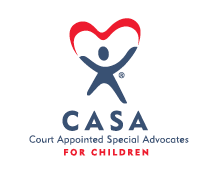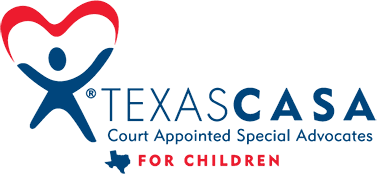![]()
2018 Impact Report
Texas CASA Leadership
A favorite phrase at the Texas CASA office is “Working together spiders can tie up a lion.” This speaks to the heart of our value statement, The CASA Way – We have an uncompromising belief that we will achieve what others think is impossible, and each of us is an essential part of the solution.
From the communities to the Capitol, every member of the CASA network had a hand in the extraordinary work achieved this year. On behalf of Texas CASA and the Board of Directors, thank you for all that you do to support the CASA mission and create brighter futures for all Texas children.
Since our founding in 1989, we have worked to turn our vision of a safe, positive future for all Texas children into a reality by providing groundbreaking initiatives and collaborating across the system. Each year, Texas CASA and the CASA network in Texas take new steps forward for the children and youth we serve, thanks to supporters like you. We are continuing to evolve at every level of the network to find new and better ways to advocate for children. Together, we are ensuring that the voices of children, families and CASA are heard.
At Texas CASA, we know that we must continue to enhance the CASA network and the way we advocate for children and families involved with the child welfare system. We are dedicated to continuing to build on the foundational tools and skills for CASA advocates, while also ensuring that everyone involved in a case has a seat at the table. When we all work together, we can create a better future for Texas children.
We are honored to be leading this organization with its long legacy of speaking up for children and youth, and look forward to another great year of strong advocacy from our communities to the Capitol.
Why CASA Matters
When a child is taken from their home — their only sense of family — due to abuse and/or neglect, the separation can be disruptive, confusing and very scary, to say the least. Once in care, these children will likely face additional trauma and grief. CASA volunteers stay by their side, advocating for the right resources and support they need to thrive during their time in the child welfare system. CASA volunteers provide a consistent presence in their lives to explain what is happening, why it’s happening and what will happen next, so that they never face navigating through the child welfare system unprepared and alone.
A powerful story that takes us through a year in the life of a child in foster care, depicting the crucial role of a CASA volunteer, is “Emily’s Dragon.” Though fictional, the story, based on real-life situations that children face in the foster care system, is told through the eyes of Emily, a young girl who is removed from an abusive home. The film follows Emily as she’s placed in different homes and schools and comes across numerous new faces and scary dragons. In Emily’s world, the dragons embody fear, unhappiness, loneliness and, at times, despair.
Emily goes through many difficulties while she is under the state’s care, but then she meets Maria, her CASA volunteer. With Maria’s advocacy and constant reassurance, Emily finds a hero who speaks up for her educational, physical and emotional needs, who stays with her throughout her journey, and teaches her a valuable lesson — she doesn’t have to face the dragons alone. The story helps build awareness about the important and crucial role Emily’s CASA volunteer plays in keeping her safe during this critical time in her life.
![]()
Texas CASA &
Local Programs
Texas CASA works tirelessly with the CASA community in Texas to make a difference in the lives of children in the child welfare system. As the statewide organization, Texas CASA works hand-in-hand with local CASA programs to develop groundbreaking initiatives and legislative priorities that advance the child welfare system — ultimately working to improve child outcomes and enhancing the way volunteers advocate for the children they serve.
At the local level, CASA programs provide training and support to the dedicated volunteer advocates speaking up for children in care. Texas CASA’s role at the state level is to provide legislative, financial and operational services to the local CASA programs including coaching for executive directors, board members and volunteer recruiters. Together, we seek out the most committed volunteers who will work diligently in advocating for our Texas children.
Impact Numbers
Fiscal Year 2018: September 1, 2017 – August 31, 2018
Volunteers
Children Served
Counties Served
Programs
Children in Care
![]()
TEXAS CASA SERVICES
Texas CASA continues to lead the charge in cultivating a strong statewide network that will not rest until children in care have the support, resources and connections they need to thrive.
Accountability
Texas CASA has established itself as a trusted partner in its role to identify, disperse, administer and manage federal, state and private funds and to ensure the local CASA programs effectively utilize the funding to achieve the CASA mission.
Policy
Texas CASA collaborates with stakeholders, the state child welfare system and elected officials to assure sound public policies that focus on issues affecting children in the child welfare system. Working with local CASA programs and volunteers, and change other parties of interest to other partner organizations, Texas CASA sets a solid foundation for improving advocacy for the children in our communities.
Leadership
Texas CASA invests in expanding the skill sets of local CASA program board members and executive directors to better serve their programs, volunteers and ultimately our children by empowering them with innovative and effective training opportunities.
Support
Key initiatives and technical assistance powered by Texas CASA help local CASA programs continue to enhance their efforts and create brighter outcomes for Texas children and youth in the child welfare system.
Education
Texas CASA brings the CASA network and the child welfare community together to educate and inform for a better understanding of the system and the existing needs of children in care so that we can collaborate to generate change. By developing a Texas-specific Pre-Service Volunteer Training Curriculum, we are ensuring that every volunteer is equipped to provide the highest level of advocacy.
Awareness
In order to help local CASA programs, strengthen their ability to advocate and collaborate with their community, Texas CASA provides communication tools to increase public awareness, recruit volunteers and reinforce local marketing efforts.
![]()
Public Policy
Texas CASA is in the unique position to help reshape the foster care system by working with the Texas Legislature to implement bills that will have far-reaching impact on all Texas children.
The 32 Legislative Advocacy Teams (LATs) continue to foster relationships with legislators and the community. Led by volunteer advocates and/or board members from local CASA programs, LATs play a vital role in helping to advocate for child welfare reform with state elected officials, furthering our legislative priorities.
Our Public Policy team works directly with the LATs and supports them by providing the tools they need to reach local legislators, help develop policy agendas to improve the child welfare system, and advocate for positive systemic change at the grassroots level.
Never doubt that a small group of thoughtful, committed citizens can change the world; indeed, it’s the only thing that ever has.
![]()
Making CASA a
Household Name
Statewide Awareness Campaign
The campaign has evolved, leveraging innovative recruitment methods to reach qualified volunteers. One example of this is the Nominate A CASA campaign. Because Texas CASA has identified that a large amount of volunteer referrals are the result of word of mouth, the Nominate campaign engages our audience online, inviting them to fill out an electronic form to nominate someone they believe would be a powerful advocate for a child. The nominated person receives an email notifying them of the honor and is prompted to visit BecomeACASA.org to learn more about the opportunity.
Additionally, Emily’s Dragon, an 8-minute short film, was adapted into a 30-second video in both English and Spanish and ran on multiple platforms as part of the paid media campaign and through social media channels. The video tells a powerful story narrated in the point of view of a small girl who has been removed from her abusive home and placed in foster care. The audience follows Emily’s emotional journey and learns how crucial the role of a CASA volunteer is in ensuring a child has someone by their side to support and advocate for them. The video is also being shared in presentations and organically on social media channels throughout the network and country and has had more than 270,000 Facebook views to date.
Clergy, CASA, and Community
Texas CASA is hosting in-depth conversations with representatives and key stakeholders from faith communities to learn more about how we can engage and partner with faithbased organizations to increase local programs’ recruitment efforts. Together we will continue to meet and collaborate to design a faith-based recruitment initiative that will foster positive youth development and further enhamce connections and support systems within the faith and CASA communities.
Men of CASA
Many children in foster care do not have a reliable father figure or positive male role model in their lives. Currently, 51 percent of kids in the child welfare system are male, but only 16 percent of CASA volunteers are male. In order to strengthen our recruitment efforts, CASA spent 18 months researching male volunteer recruitment trends, best practices and successful male volunteer recruitment models. An additional nine months were dedicated to conducting male-only focus groups throughout Texas.
Using all of the ideas and information from the focus groups, Texas CASA developed Men of CASA – Fighting for Kids, a recruitment model focused on recruiting, engaging and networking with men throughout Texas. In addition, a Men of CASA Toolbox is now available as a recruitment kit and contains resources to assist with the implementation of Men of CASA. Designed to improve efforts to recruit and engage with male volunteers, the toolkit includes resources such as the Blueprints for Male Recruitment Guidebook, marketing tools and other collateral.
Conversations with CASA
This new video series from Texas CASA explores current issues and trends affecting child welfare, children in care and the CASA network. The monthly installments feature Texas CASA CEO Vicki Spriggs and prominent community leaders within the Texas child welfare system. Each episode tackles a different topic that highlights systemic challenges, assesses areas needing attention and discusses evolving advocacy efforts.
![]()
Community & Family Connections
The Walker children first entered the system because of neglect. Both parents were struggling with addiction and were not suitable to care for them. Understanding how crucial family connections are to improve the outcome of these siblings, CPS and CASA collaborated to find family members who would be willing to care for the children.
Fortunately, they were able to get in touch with their grandparents who agreed to take the children into their care. Because of this partnership between CPS and CASA, the Walker family was connected to family members, friends and members of the parents’ Narcotics Anonymous group — who engaged them for planning meetings. As a result, the parents received support throughout the process while the children remained in a safe environment. Within 9 months, the children were reunited with their parents and the Walker family’s case was closed.
This is a true story of the impact of the Collaborative Family Engagement (CFE) initiative. The family’s name has been changed to protect their privacy.
Collaborative Family Engagement (CFE)
Collaborative Family Engagement (CFE), a partnership between local CASA programs and Child Protective Services (CPS), is focused on finding and engaging committed adults who are willing to wholeheartedly support children long after CASA and CPS involvement ends.
By helping to create enduring relationships with blood relatives and other key people, CFE builds supportive connections who work together as a community to ensure the child is well taken care of and feels a sense of connection.
With CFE, parents and families take an active part in the planning and decision-making for their children. Those involved in the case are given the resources and information needed to keep children safe and build and strengthen connections for the child and their family.
FAMILIES ARE ABLE TO:
- Stay more informed about every step in the process of the case,
- Know what all of their options are concerning their family,
- Help establish a network of support around their family,
- Build stronger working relationships with CPS and CASA,
- Help find somewhere for the child to stay if out-of-home care is needed, and
- Help move the case along faster — hopefully ending with reunification.
CASA & CPS CFE Teams Have Completed:
Trainings
People Trained
Resulting In:
Family Meetings
Families Engaged in CFE
Children & Youth in Care Engaged in CFE
Financials
FY 2018: SEPTEMBER 1, 2017 — AUGUST 31, 2018
Revenue
| State Funding | $13,393,689 |
| Federal Funding | $16,899,543 |
| Private Funding | $1,599,199 |
| Total Revenue | $31,892,431 |
Expenses
| LOCAL PROGRAM SUPPORT SERVICES & TRAINING | $27,025,265 |
| VOLUNTEER RECRUITMENT & AWARENESS | $2,220,962 |
| GRANTS MANAGEMENT & DEVELOPMENT | $624,076 |
| ADMINISTRATION | $1,112,419 |
| PUBLIC POLICY ADVOCACY | $294,371 |
| Total Expenses | $31,892,431 |
Pass-Through
Amount*
%
OR
of the government funding that Texas CASA receives is awarded to local programs for recruitment, training and volunteer support.
* Pass-Through Amount includes $1.5M for the Statewide Recruitment Campaign.
![]()
Thank You to our Donors!
Donors Who Contributed
$100,000+


$25,000 – $99,999






$10,000 – $24,999














$5,000 - $9,999
- Debbie Alsup
- Anonymous (2)
- Edwin Jennings III
- Elkay
- Ernst & Young
- Galveston Island Convention Center at The San Louis Resort
- Jill Kean
- McCraw Oil/Kwik Chek
- Pegasus Schools, Inc.
- Randolph Brooks Federal Credit Union
- John Sampson
- State Water Heaters
- The Dorset Foundation
- Thompson & Knight, LLP
- Robert Vannuccini
$1,000 - $4,999
- Amerigroup Texas Inc.
- Anonymous
- Brattain Family Charitable Fund
- Patrick & Marina Breeland
- Susan & Glenn Brooks
- Chris Buck
- Care Options for Kids
- Mark A. Chapman Foundation
- Karen Cheng
- Kevin Corbett
- Texas Women’s Foundation
- Pattilou Dawkins
- Renee Day
- Sue DiCristofaro
- Debbie Dugger
- Jacque Flagg
- Veronica Marquez
- Frost Bank
- Shari Griswold
- John & Erika Gump
- Jenny Haynes
- Alexis Ivans
- Ivan Jaime
- Andrew Kever
- Knight Security Systems
- Melissa & Mark Jones
- Tom Jones
- JustGive
- John Knight
- Bill Lauderback
- Wade Lorber
- The Suzanne Schmidt and Donald James Maloney Family Fund of the Foundation for Southeast Texas
- Parker McCollough
- Dr. Dan McCoy
- Jim McReynolds
- Monica & Ramon Mitre
- Leslie & Neel Morton
- Susie Moseley
- Holly Munin
- Becky & Gene Needham
- Next Level Insurance Agency LLC
- Nelda Peterson Howard
- Tracy Pierce
- Praesidium
- Heidi Restivo
- Emily & Orion Robillard
- Peter Rosch
- David Setzer
- Kevin Smartt
- Vicki Spriggs
- Beth St. Paul
- STCH Ministries
- Upbring
- John Paul Urban
- Vinson & Elkins, LLP
- Eric White
- Kenneth Wilson
- Kenneth Winburn
- David Winn
- Monica & Greg Wilhelm
- Fred Williams
- Laura Wolf
- Wolflin Mortgage Company
- Chloe Yates
$500 - $999
- Michelle Abedelfatah
- Jenny Alperin
- Inger Elisabet Barker
- Judy Beckman
- April Beggs
- Shannon Briggs-Hack
- Larry Bush
- Caroline Caven
- Rudy Colmenero
- Michael Connors
- Bill & Crystal Cross
- Jeanne Donovan
- Kenneth Franks
- Shannon Hinshaw
- Dennise Jackson
- Kendra Scott
- Sonya Galvan
- Jim Hine
- Doug Hunt
- Kathleen LaValle
- Mark Lippe
- Ella Minick
- Julie Moore
- Shelly Mosing
- Fran & AR Perez
- Celeste Prather
- Stella Ella Fashion
- David Stern
- Natalie Thornton
- Yolanda Valenzuela
- Gloria Young Family Foundation
- 3dASAP Shop CASA
![]()
Get Involved
Ways you can make your financial contribution to Texas CASA and the CASA network:
- Make a secure online donation at TexasCASA.org/donate
- Text the word “Give” to 512.960.1711
- Mail your check to:
Texas CASA
1501 West Anderson Lane, Suite B-2
Austin, TX 78757
Gifts of stock, bonds or mutual funds are another way to make a difference to children across Texas. You can also make a legacy gift to Texas CASA by bequest through your trust or retirement plan.
Corporate Partnerships
Take your employee engagement to the next level and help create brighter futures for all Texas children by partnering with Texas CASA. Texas CASA has a variety of options to help your company reach its social responsibility goals, all while making a difference in the lives of children in the foster care system.
- COMPANY GIVING
- COMPANY VOLUNTEERING
- EVENT SPONSORSHIPS
- GRANTS & AWARDS
As an integral part of our community, we offer three ways you can help us continue our uncompromising commitment to provide a CASA volunteer for every single child who needs one.
- VOLUNTEER. Ready to speak up for a child who needs you? Visit BecomeACASA.org to locate and contact your local CASA program and take the first step towards becoming a CASA volunteer.
- NOMINATE. If you know someone who has what it takes to speak up for children, let them know by nominating them to become a CASA volunteer at NominateACASA.org.
- DONATE. A donation to Texas CASA is an investment in the power of the CASA community and the future of Texas children. With your gift to Texas CASA, you can help CASA programs in your community AND around the state to provide the very best volunteer advocacy for children removed from their homes due to abuse and/or neglect. Donate Now.

